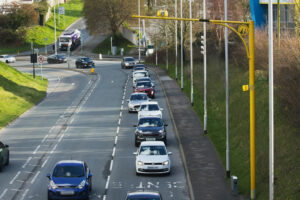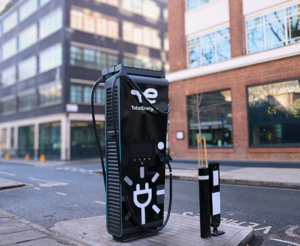Wide-ranging research has found that keeping roads well-maintained not only saves money but reduces traffic CO2 emissions reports Paul Boss, Chief Executive of the Road Surface Treatments Association (RSTA).
Implementing planned programmes of preventative road maintenance is far more cost effective than repairing potholes. It costs £3 to £5 per m2 to surface dress and maintain a road but costs on average over £50 per m2 to repair potholes.
Savings for stretched highways budgets is not the only benefit. A wide pool of research proves that well maintained roads can also help to reduce the carbon emissions of road traffic.
With transport now accounting for the majority of UK emissions -26% of all emissions – the contribution that a well-maintained road network can make towards to their reduction should be recognised and pursued.
Research has found that this contribution can be significant. A technical report ‘Analysis of the relationship between road pavement maintenance condition, fuel consumption and vehicle emissions’ published earlier this year by the Brussels-based Smart Transport Alliance found that good road surface conditions result in reductions of fuel consumption and CO2 emissions of up to 3.5% for light vehicles and 4% for heavy vehicles.
Meanwhile, the European Automobile Manufacturers Association believes that maintaining the European road network with planned programmes of surface dressing could result in a CO2 emission reduction of 5% by 2035.
Similar findings were reported by research led by the Department of Civil and Environmental Engineering at Rutgers University – New Brunswick. This found that the improved road surface condition resulting from preventative maintenance programmes can save highway authorities spending by 10% to 30%, reduce greenhouse gases by up to 2%, and allow drivers to reduce their fuel consumption by 2% to 5%. Whilst of survey over 5,000 lane-miles of Virginia’s interstate highway system by the Massachusetts Institute of Technology (MIT) Concrete Sustainability Hub (CSHub) found that the maintenance of just a few lane miles allows for significant performance improvement, along with lowered environmental impact, across the entire network.
Mr Boss said: “Maintaining just 1.5% of the roadway network would lead to a reduction of 10% in greenhouse gas emissions statewide. The research carried out by a variety of universities emphasises how a road surface maintained in good condition promotes a smoother and more efficient ride and it is this that reduces fuel consumption and CO2 emissions.
“This should be an important consideration for highway authorities for, in addition to meeting public expectations of improved environmental efficiency, local authorities have a statutory duty under their NI 185 and NI 186 obligations to reduce their carbon emissions. Implementing proactive programmes of road surfacing and road maintenance can help them meet those obligations.”
























